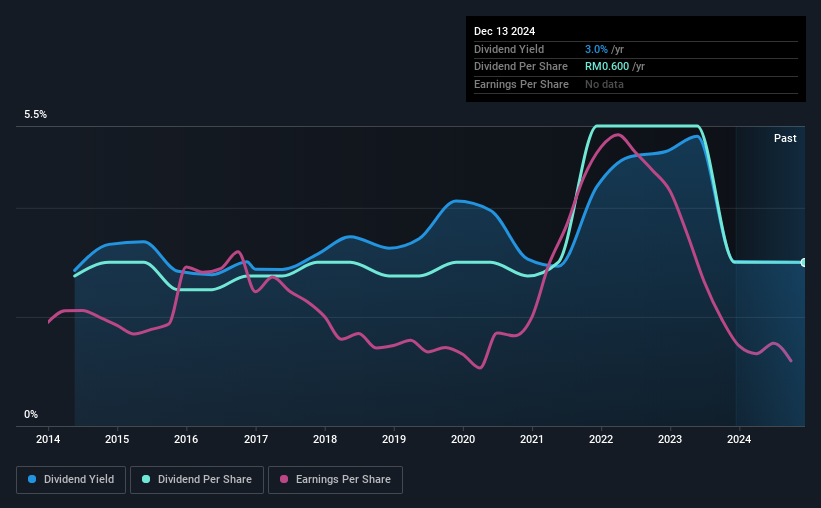Batu Kawan Berhad (KLSE:BKAWAN) Has Affirmed Its Dividend Of MYR0.40
Batu Kawan Berhad's (KLSE:BKAWAN) investors are due to receive a payment of MYR0.40 per share on 26th of February. This means that the annual payment will be 3.0% of the current stock price, which is in line with the average for the industry.
View our latest analysis for Batu Kawan Berhad
Batu Kawan Berhad's Future Dividend Projections Appear Well Covered By Earnings
We like to see a healthy dividend yield, but that is only helpful to us if the payment can continue. The last payment was quite easily covered by earnings, but it made up 135% of cash flows. This signals that the company is more focused on returning cash flow to shareholders, but it could mean that the dividend is exposed to cuts in the future.
EPS is set to fall by 3.5% over the next 12 months if recent trends continue. However, if the dividend continues along recent trends, we estimate the payout ratio could reach 86%, meaning that most of the company's earnings is being paid out to shareholders.

Dividend Volatility
The company's dividend history has been marked by instability, with at least one cut in the last 10 years. The annual payment during the last 10 years was MYR0.55 in 2014, and the most recent fiscal year payment was MYR0.60. Dividend payments have grown at less than 1% a year over this period. We're glad to see the dividend has risen, but with a limited rate of growth and fluctuations in the payments the total shareholder return may be limited.
The Dividend's Growth Prospects Are Limited
Growing earnings per share could be a mitigating factor when considering the past fluctuations in the dividend. It's not great to see that Batu Kawan Berhad's earnings per share has fallen at approximately 3.5% per year over the past five years. If the company is making less over time, it naturally follows that it will also have to pay out less in dividends.
Batu Kawan Berhad's Dividend Doesn't Look Sustainable
In summary, while it's good to see that the dividend hasn't been cut, we are a bit cautious about Batu Kawan Berhad's payments, as there could be some issues with sustaining them into the future. With cash flows lacking, it is difficult to see how the company can sustain a dividend payment. We don't think Batu Kawan Berhad is a great stock to add to your portfolio if income is your focus.
It's important to note that companies having a consistent dividend policy will generate greater investor confidence than those having an erratic one. At the same time, there are other factors our readers should be conscious of before pouring capital into a stock. Just as an example, we've come across 3 warning signs for Batu Kawan Berhad you should be aware of, and 1 of them is concerning. Looking for more high-yielding dividend ideas? Try our collection of strong dividend payers.
Valuation is complex, but we're here to simplify it.
Discover if Batu Kawan Berhad might be undervalued or overvalued with our detailed analysis, featuring fair value estimates, potential risks, dividends, insider trades, and its financial condition.
Access Free AnalysisHave feedback on this article? Concerned about the content? Get in touch with us directly. Alternatively, email editorial-team (at) simplywallst.com.
This article by Simply Wall St is general in nature. We provide commentary based on historical data and analyst forecasts only using an unbiased methodology and our articles are not intended to be financial advice. It does not constitute a recommendation to buy or sell any stock, and does not take account of your objectives, or your financial situation. We aim to bring you long-term focused analysis driven by fundamental data. Note that our analysis may not factor in the latest price-sensitive company announcements or qualitative material. Simply Wall St has no position in any stocks mentioned.
About KLSE:BKAWAN
Batu Kawan Berhad
An investment holding company, cultivates and processes palm and rubber products in Malaysia, the Far East, the Middle East, South East Asia, Southern Asia, Europe, North and South America, Australia, Africa, and internationally.
Proven track record average dividend payer.
Similar Companies
Market Insights
Community Narratives


Recently Updated Narratives


Engineered for Stability. Positioned for Growth.


MINISO's fair value is projected at 26.69 with an anticipated PE ratio shift of 20x


Fiverr International will transform the freelance industry with AI-powered growth
Popular Narratives


MicroVision will explode future revenue by 380.37% with a vision towards success


NVDA: Expanding AI Demand Will Drive Major Data Center Investments Through 2026



